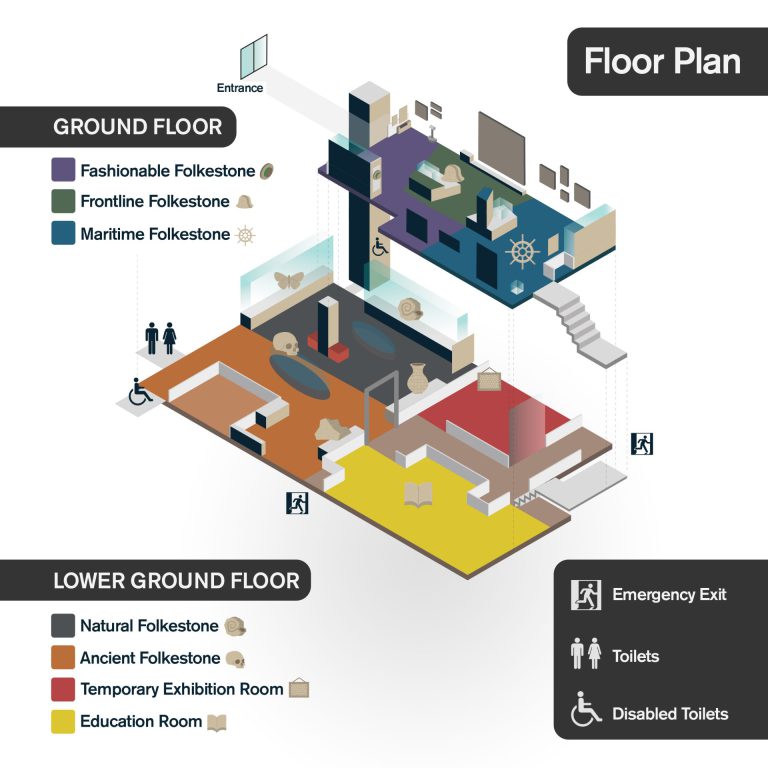Access Guide
Folkestone Museum welcomes everyone. Our team will do everything we can to make your visit enjoyable. On this page, you’ll find an overview of our facilities to help you plan your visit.
If you’d like any more information, please contact us on 01303 257946 or email museum@folkestone-tc.gov.uk for more information.
Download our Access Guide (Word, 19kb)
Our Address
Folkestone Museum
Folkestone Town Hall
1-2 Guildhall Street
Folkestone
Kent
CT20 1DY
Getting to us
Arriving by train
Folkestone Museum is 15 minutes’ walk from Folkestone Central Train station. Folkestone and Hythe District Council’s ‘A Brighter Future’ works are currently transforming the route from the train station to the town centre. Works are blocking the pavement in some places.
Arriving by bus
Folkestone Bus Station’s stops are a short walk from Folkestone Museum. When you get off the bus, turn right and go down the hill to Guildhall Street. The Museum is 160 metres from the end of Guildhall Street, on the left.
Arriving by car
Folkestone Museum doesn’t have its own car park. You can park in Shellons Street Car Park, on St Eanswythe’s Way, Folkestone, CT20 1BP, which has two accessible parking spaces. Our rear entrance is 30 metres walk away from the car park.
There is no drop-off space outside the museum.
At the Museum

Entrances
The front entrance of the museum is on Guildhall Street, at the bottom of Folkestone’s main high street. The High Street is cobbled and can be uneven.
The entrance to the museum is step-free. You might need to wait a moment for our automatic entry doors to open. There is a five-metre ramp inside to enter the museum.
Our rear entrance, on the lower ground floor of the museum, is on Market Place. Market Place is paved with uneven cobbles. This entrance is step-free – a ramp leads down into the museum. If you would like to use this entrance, please call 01303 257946, and a member of museum staff will come and help you.
The museum is on two floors. There is lift access between both floors of the museum and between the museum and the Silver Screen Cinema. The lift is located through a set of double doors on the left side of reception, opposite the reception desk.
Seating
You will find comfortable seating in both our upper ground and lower ground floors. There is additional portable seating in our Lower Ground Floor gallery.
Quiet visiting times
If you would like to visit the museum at a less busy time, you could visit between ten and eleven o’clock, or three and four o’clock.
Toilets
You’ll find our visitor toilets are on the lower ground floor. The accessible toilet is fitted with a National Key Scheme lock. You will need a RADAR key to open the door. You can borrow a RADAR key from our main reception desk if you need to.
Baby changing facilities
You can find the museum’s baby changing facilities in our men’s and ladies toilets on the lower ground floor.
Visitors with sight loss
Guide dogs and other assistance dogs are welcome at Folkestone Museum. The light levels on our ground floor are low.
Visitors with hearing loss
You can borrow a portable hearing loop from our reception desk. There are also written transcripts of our audio recordings next to each earphone.
Visitors with dementia
Folkestone Museum’s staff have all received Dementia awareness training, and they will be able to help you during your visit.
On the first Wednesday of every month, from 1:30 to 3:30, Folkestone Museum holds an art and crafts workshop designed for people with dementia. If you would like to know more about these workshops, please email alison.moore@folkestone-tc.gov.uk.
Sensory backpacks
You can borrow a sensory backpack from our reception desk. There are four backpacks to choose from. In each backpack, you’ll find ear defenders, a magnifying glass, a sand timer, a fidget toy, a happy/sad emotion fan, a symbols trail and a symbols choosing board. Each bag also has a cuddly guide or friend, and other themed objects inside.
The grey bag’s theme is boats and fishing. The yellow bag’s theme is dinosaurs and fossils. The blue bag’s theme is the sea. The green bag’s theme is railways and trains.
To borrow a bag, take one of the bags from the wall to reception. You’ll receive a form to fill in to borrow the bag. If you need assistance, the person on reception can help you.
Folkestone Museum's Visual Story
Folkestone Museum’s Visual story can help you plan your visit. It gives visitors an idea of what to expect at the museum. The story includes text and images.
